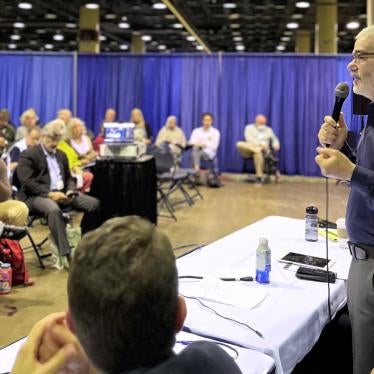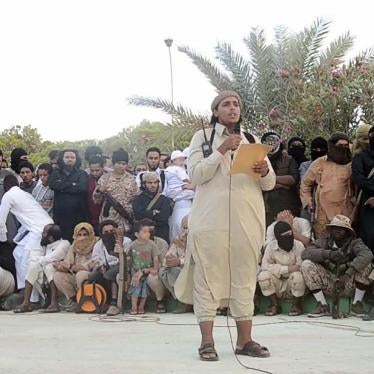The Obama administration’s handling of the September attack in Benghazi, which killed the U.S. ambassador and three other US citizens, became a matter of heated presidential campaign debate. But Libya should not be allowed to gradually fall off the U.S. radar, even if it’s no longer time to score political points. Policy makers and analysts should learn from the deadly attack and review how the U.S. government and others can help Libya build stability and security after 42 years of dictatorship.
Here are some ideas to start that conversation. First, encourage and help Libya develop security forces that can operate with the professionalism, transparency and accountability that were absent for four decades under Moammar Gadhafi. Libya desperately needs effective military and police. But these forces should break with past practice and serve the public under the rule of law rather than the interests of one man.
A reported U.S. plan to help Libya develop a rapid-response anti-terrorism force could offer a useful start. But such a force should fit into broader security sector reform with recruits vetted for past abuses, trained in human rights standards and appropriately disciplined and punished when they overstep the law. The police and military should be under civilian oversight, and the armed forces should not be used for domestic law enforcement.
Second, focus simultaneously on rebuilding Libya’s dysfunctional justice system, which has largely been neglected since Gadhafi’s fall. The judicial police responsible for court security need bolstering and the prisons need modernizing. Investigators should learn how to collect evidence for use in court instead of the longtime practice of relying on confessions, often extracted with force. Throwing money into special forces and neglecting the justice system will not bring the lasting stability and security that Libyans and others seek.
Third, offer technical and if necessary financial assistance, in coordination with the U.N. mission and other international actors, to help the newly elected Libyan government disarm and reintegrate the myriad militias that wield so much power more than a year after Gadhafi’s death. This needs to be a Libyan-driven process, but outside advice and support, building on experience in other post-conflict societies, can definitely help.
Fourth, challenge the Libyan government when it strays from its domestic and international human rights obligations, and encourage allies to do the same. It does not help to remain silent about violations that continue today, such as indiscriminate attacks in Bani Walid and the forced displacement of people from Tawergha, towns considered to be pro-Gadhafi, or the destruction of religious sites of the Sufi religious minority. The U.S. government should condemn these violations and urge the Tripoli authorities to address them.
This includes punishing those responsible for serious violations, regardless of whether they fought with or against Gaddafi. The crimes of the dictator’s security forces before and during last year’s conflict need to be addressed, as well as abuses by the forces that brought him down. A new law that grants immunity to those whose acts were “promoting or protecting the revolution” against Gaddafi should be revoked.
In all this, governments wishing to assist Libya will have to walk a thin line. On one side, they should help strengthen the new government’s authority and its control over the militias and regional gangs. On the other side, they must avoid reviving the authoritarianism that thrived under Gadhafi. In other words, they must contribute to the creation of a strong central state without the abusive practices of the past.
The countries that intervened militarily in Libya have a special responsibility to help the country traverse that tightrope. In the process of democratization, getting rid of Gadhafi was just one step. The difficult work is to build independent institutions that can replace the power of one man.
Since Gadhafi’s fall, the United Sates has abdicated that responsibility. Then we saw too much U.S. attention, for domestic political reasons, on dissecting every angle of the Benghazi attack. What happened in Benghazi should be known, but the bigger question is whether the future Libya will be a country that is more stable, secure and law abiding than the Libya of the past. That is the key issue on which the Obama administration’s policies should be judged.
Fred Abrahams is Special Adviser at Human Rights Watch.








